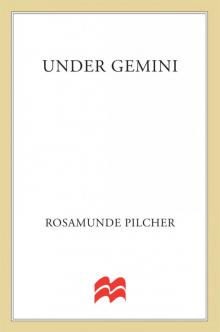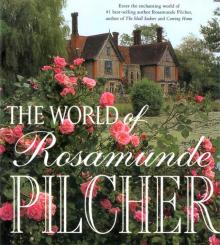- Home
- Rosamunde Pilcher
Voices In Summer Page 3
Voices In Summer Read online
Page 3
Despite this disaster, and somewhat to Alec’s surprise, Tom instantly fell in love with Daphne. For a long time she resisted his blandishments and continued to play her own extensive field, but Tom was a dogged fellow and regularly begged her to marry him, only to be fobbed off yet again with endless excuses and procrastinations. His moods, consequently, varied from euphoric elation to the deepest gloom, but, just as he finally put Daphne out of his life forever, she, perhaps sensing this, suddenly did a volte-face, threw over all the other young men, and told Tom that she would marry him after all. Alec was their best man, and Daphne duly moved into Tom’s flat, as a very young and very inexperienced Mrs Boulderstone.
It was necessary for Alec to move out, and it was at this early stage in his career that he bought the house in Islington. Nobody else that he knew lived in Islington, but when he first saw it, it seemed to him larger and more attractive than any of the poky mews and cottages that belonged to his friends. It had the added inducement of costing a great deal less than property in other parts of London. And it was only minutes from the City.
The bank helped him with his mortgage and he moved in. The house was tall and thin, but it had a good basement, which he did not really need, so he put an advertisement in the local paper, which was answered by Mrs Abney. She was a widowed lady in early middle age. Her husband had been a builder; she had no children. Only Dicky, her canary. She would have to bring Dicky with her. Alec said that he had no objection to canaries, and it was agreed that Mrs Abney should move in. It was an arrangement to their mutual satisfaction, for now Mrs Abney had a home and Alec a live-in caretaker and someone to iron his shirts.
* * *
When Alec had been with Sandberg Harpers for five years, he was transferred to Hong Kong.
Tom was staying in London, and Daphne was wildly jealous. ‘I can’t think why you’re going and Tom isn’t.’
‘He’s brighter than I am,’ said the good-natured Tom.
‘He’s nothing of the sort. He’s just bigger and better looking.’
‘Now, that’s enough of that.’
Daphne giggled. She loved it when Tom became masterful. ‘Anyway, Alec darling, you’ll have the most wonderful time and I’m going to give you the address of my best girlfriend, because she’s out there just now, staying with her brother.’
‘Does he work in Hong Kong?’
‘Probably Chinese,’ said Tom.
‘Oh, don’t be silly.’
‘Mr Hoo Flung Dung.’
‘You know perfectly well that Erica’s brother isn’t Chinese; he’s a captain in the Queen’s Loyals.’
‘Erica,’ said Alec.
‘Yes. Erica Douglas. She’s frightfully glamorous and good at games and everything.’
‘Hearty,’ murmured Tom, who was in a maddening mood.
‘Oh, all right, hearty, if you want to spoil everything.’ She turned back to Alec. ‘She isn’t hearty; she’s just the most marvellous person, frightfully attractive.’
Alec said that he was sure that she was. A week later he flew to Hong Kong, and once he had settled himself in, he went in search of Erica. He found her, living with friends, in a beautiful house up on the Peak. A Chinese houseboy answered the door and led him through the house and out onto the shady terrace. Below was a sunbaked garden and a blue, kidney-shaped swimming pool. Missy Ellica was swimming, the houseboy told him with a gentle gesture of his hand, and Alec thanked him and set off down the steps. There were six or seven people around the pool. As he approached, an older man observed him and got out of his long chair to come and meet him. Alec introduced himself and explained the reason for his call, and the man smiled and turned towards the swimming pool.
A girl, alone, was swimming there, moving up and down its length with a smooth, expert crawl.
‘Erica!’ She lolled onto her back, sleek as a seal, her black hair clinging to her head. ‘Someone to see you!’ She swam to the side of the pool, pulled herself effortlessly out of the water, and came to meet him. She was very beautiful. Tall, long-legged, copper brown, her face and body running with droplets of water.
‘Hello.’ She smiled and her smile was wide and open, her teeth even and shining white. ‘You’re Alec Haverstock. Daphne wrote and told me. I got a letter yesterday. Come and have a drink.’
He could scarcely believe his good fortune. He asked her out for dinner that very evening, and after that they were seldom apart. After murky London, Hong Kong was a positive fairground of pleasures to be enjoyed: a crowded, teeming fairground, to be sure, where poverty and riches rubbed shoulders on every corner; a world of contrasts that both shocked and delighted; a world of heat and sunshine and blue skies.
There was, all at once, so much to do. Together they swam and played tennis, went riding in the early mornings, sailed her brother’s little dinghy on the breezy blue waters of Repulse Bay. At night they were inundated with all the glitter and glamour of Hong Kong’s considerable social life. There were dinner parties in establishments more luxurious than he had ever dreamed existed in this day and age. Cocktail parties on board visiting cruisers; regimental occasions—the Queen’s Birthday and Beating Retreat; naval occasions. Life for young people on the brink of falling in love seemed to have no limit to the good things it had to offer, and it finally sank through to Alec that the best thing of all was Erica herself. One evening, as he drove her home after a party, he asked her to marry him, and she gave a typical shout of pure pleasure and flung her arms around his neck, very nearly causing him to run the car off the road.
The next day they went shopping and bought her the biggest star sapphire engagement ring that he could afford. Her brother gave a party for them in the Mess, and there was more champagne drunk that evening than Alec had ever seen consumed in such a relatively short time.
They were married in the cathedral in Hong Kong by the bishop. Erica’s parents flew out from England for the ceremony, and Erica wore a dress of fine white cotton lawn, encrusted with white embroidery. They spent their honeymoon in Singapore and then returned to Hong Kong.
And so the first year of their married life was passed in the Far East, but the idyll finally had to end. Alec’s term of duty was over, and he was recalled to London. They returned in November, a gloomy enough month at the best of times, and when they came to the house in Islington, he picked her up and carried her over the doorstep, which meant, at least, that she didn’t get her feet wet, because it was pouring with rain at the time.
Erica didn’t think much of the house. Seen through her eyes, Alec had to admit that the décor was fairly uninspired, and he told her to do what she wanted to do with it, and he would foot the bill. This delightful ploy kept her happy and busy for some months, and by the time the house had been reconstructed, redecorated, and refurnished to Erica’s exacting standards, Gabriel was born.
Holding his daughter for the first time was one of the most astonishing experiences in Alec’s life. Nothing had prepared him for the humbleness, the tenderness, the pride he experienced as he pushed aside the baby’s shawl and looked for the first time into her small, downy face. He saw the brilliant blue of her open eyes, the high forehead, the crest of spiky, silky, black hair.
‘She’s yellow,’ said Erica. ‘She looks like a Chinese.’
‘She isn’t really yellow.’
Some months after Gabriel’s birth he was sent east again, this time to Japan. But now everything was different, and he was almost ashamed of his reluctance to leave his little daughter, even for three months. He admitted this to nobody, not even Erica.
Least of all Erica. Because Erica was not a natural mother. She had always been more interested in horses than children and had shown a sad lack of enthusiasm when she had realized that she was pregnant. The physical manifestations of child-bearing revolted her … she hated her swollen breasts, her ballooning abdomen. The long wait bored her, and even the interest of doing up the old house could not make up for morning sickness, lassitude, and occasional fatigu
e.
And now, she hated Alec going back to the Far East without her. She resented his going on his own, while she stayed behind, mouldering in London, just because of Gabriel.
‘You can’t blame Gabriel. Even if we didn’t have Gabriel, you couldn’t come with me because it’s not that sort of a trip.’
‘And what am I supposed to do with myself? While you’re gallivanting around with the geisha girls?’
‘You could go and stay with your mother.’
‘I don’t want to go and stay with my mother. She fusses over Gabriel until I could scream.’
‘Well, I tell you what…’ She was lying on their bed during this particular exchange, and now he sat beside her and laid his hand on the sulky curve of her hip. ‘Tom Boulderstone’s been on to me about an idea he’s had. He and Daphne want to go to Scotland in July … for the fishing. The Anstey’s are going as well, and they thought that we might go too and make up a party.’
After a bit, ‘Whereabouts in Scotland?’ Erica asked. She still sounded sulky, but he knew that he had caught her attention.
‘Sutherland. It’s called Glenshandra. There’s a very special hotel, with marvellous food, and you wouldn’t have to do anything but enjoy yourself.’
‘I know. Daphne told me about it. She and Tom went last year.’
‘You’d like fishing.’
‘What about Gabriel?’
‘Perhaps your mother could have her? What do you think?’
Erica turned over onto her back and pushed her hair out of her eyes and gazed at her husband. She began to smile. She said, ‘I’d rather go to Japan.’
He leaned over and kissed her open, smiling mouth. ‘Next best thing.’
‘All right. Next best thing.’
* * *
And so the pattern of their lives evolved, and as the years slipped by, Alec’s career broadened and became more involved and more responsible as he climbed his own particular ladder of success. Gabriel was four. Then she was five and starting school. When Alec had time to stop and stand and look at his family life, he supposed that they were as happy as any of his friends. There were ups and downs, of course, but these were only to be expected, and always—like a glittering prize waiting to be grasped at the end of a long run—there was the holiday in Scotland, which had now become an annual event. Even Erica loved this and looked forward to it as much as Alec. A natural athlete, with an athlete’s sense of timing and quick observant eye, she had taken to fly-fishing like a duck to water. Her first salmon had reduced her to a mixture of laughter and tears, and her childlike delight and excitement had almost caused Alec to fall in love with her all over again.
They were happy in Scotland, the carefree days as refreshing as a gust of clean wind blown through a stuffy house, dispersing resentments, clearing the air.
When Gabriel was old enough, they started taking her with them.
‘She’ll be a nuisance,’ said Erica, but she wasn’t a nuisance, because she wasn’t that sort of a child. She was charming, and it was at Glenshandra that Alec really got to know his little daughter—to talk to her, to listen to her, or simply to enjoy her companionable silence as she sat on the bank of the river and watched him casting over the brown, peaty water.
But even Glenshandra was not enough, and Erica was restless. She still resented Alec’s overseas commitments, his constantly leaving her for glamorous foreign parts. Every time he went, there was a row, and he would fly off, miserable, with the sound of her angry, unforgiving words ringing in his ears. Now, she decided that she hated their house. Initially she had enthused over it, but now it was too small. She was bored with it. Bored with London. He wondered if she was going to tell him that she was bored with him, too.
He could be stubborn. At the end of a long, tiring day, faced with a moody wife, he could be more stubborn than usual. He told her that he had no intention of relinquishing his convenient house for something larger out at the smart end of London, which would cost an arm and a leg and involved even more travelling.
Erica lost her temper. ‘You never think about anybody but yourself. You don’t have to spend your days in this beastly house, cooped up, surrounded by Islington pavements. What about Tom and Daphne? They’ve bought a house on Campden Hill.’
It was at this point, listening to her, that Alec first came to realize that there was a chance, a possibility, that one day his marriage to Erica would end up on the rocks. She accused him of thinking about nobody but himself, and although this was not strictly true, what was true was that most of his waking hours were spent totally absorbed in his work, with no thought for anything else. But for Erica it was different. Domesticity and motherhood were not enough for her, and although their evenings were packed with social engagements—it seemed to Alec that they were scarcely ever in for dinner—it was natural that Erica’s boundless energy yearned for more.
When she had run out of things to complain about and had fallen silent, he asked her what she really wanted.
She told him. ‘I want space. A bigger garden, space for Gabriel. That’s what I want. Space and freedom. Trees. Somewhere to ride. Do you know, I haven’t ridden since we were in Hong Kong. And before that I rode every single day of my life. I want somewhere to be when you’re abroad all the time. I want to be able to have people to stay. I want…’
What she wanted, of course, was a house in the country.
Alec bought her one. In the New Forest. Erica found it, after three months of frantic searching, and Alec took a deep breath and wrote the enormous cheque demanded of him.
It was a compromise, of course, but he had recognized the danger signals of her desperation and was now in a financial position where he was able to shoulder the added expense of such a luxury. But was it such a luxury? It would mean country weekends and holidays for Gabriel, and property, with looming inflation, was always a good investment.
The house was called Deepbrook. Early Victorian, soundly built, with many rooms, a conservatory, an acre of garden, stabling for four horses, and three acres of paddock. The face of the house was smothered in an enormous, mauve-blossomed wisteria, and there was a big lawn with a cedar tree in the middle and various rather charming, old-fashioned, overgrown rosebushes.
Erica was happy at last. She furnished the house, found a gardener, and acquired for herself a couple of horses and a little pony for Gabriel. Gabriel was now seven and she did not much like the pony, preferring to play for hours on the monkey swing Alec had fixed up in the cedar tree.
Although they seemed to get on well enough, Gabriel and her mother never had very much in common. When she was eight, Erica began to make noises about sending Gabriel to boarding school. Alec was appalled. He did not approve of sending small boys to boarding school at such a tender age, let alone little girls. This argument continued for some time, without coming to any conclusion, but was ended abruptly by Alec having to go to New York for three months.
This time there were no recriminations, no complaints. Erica was schooling a young horse for showing, and she saw him off with scarcely a backward glance, having no thoughts in her head for anything but the job in hand. At least Alec assumed that she had no other thoughts, but when he returned from New York, he was told that she had found the perfect little boarding school for Gabriel, had put her name down, and the child would start there the following term.
It was a Sunday. He had flown into Heathrow that morning and driven straight down to Deepbrook. Erica presented him with her fait accompli in the drawing room, while he was pouring her a drink, and it was there, facing each other like antagonists across the hearthrug, that they had their most resounding row.
‘You had no business…’
‘I told you I was going to do it.’
‘I told you that you weren’t to. I won’t have Gabriel being packed off to some boarding school.…’
‘I’m not packing her off. I’m sending her. For her own good…’
‘Who are you to decide what’s good for her?’
‘I know what isn’t good for her, and that is staying at the crummy little day school in London. She’s an intelligent child—’
‘She’s only ten.’
‘And she’s an only child. She needs companionship.’
‘You could give her that if you weren’t too busy with your bloody horses.…’
‘That’s a lie … and why shouldn’t I have my horses? God knows I’ve given up enough of my time taking care of Gabriel.… It’s not as though I’ve ever had any help from you … you’re away half the time.’ She began to pace up and down the room. ‘And I’ve tried to interest her in the things I do … heaven knows I’ve tried. I bought her that little pony, but she’s more interested in watching television or reading books. How is she ever going to make friends with anybody if she never does anything but that?’
‘I don’t want her to go to boarding school.…’
‘Oh, for heaven’s sake stop being so selfish.…’
‘I’m thinking about her. Don’t you understand that? I’m thinking about Gabriel.…’
He was cold with rage, he could feel his anger like a physical thing, knotted hard against his chest. Erica said nothing. Turning at the far end of the room, she stopped, suddenly still, staring not at Alec but beyond him. Her expression did not change; pale and cold she stood there, her hands clenched, taut and bloodless around the scarlet wool of her sweater.
In the silence that followed, Alec laid down his glass and slowly turned. Behind him, in the open doorway, stood Gabriel. She wore old jeans and a sweat shirt with Snoopy on the front. Her feet were bare, her long dark hair like a curtain of silk falling down her shoulders.
For a long moment he looked into her eyes, and then her gaze fell and she stood there, fiddling with the door handle, waiting to be told something. Waiting to be told anything.

 Wild Mountain Thyme
Wild Mountain Thyme Sleeping Tiger
Sleeping Tiger Flowers in the Rain & Other Stories
Flowers in the Rain & Other Stories September
September The Blue Bedroom: & Other Stories
The Blue Bedroom: & Other Stories The Carousel
The Carousel The End of Summer
The End of Summer Snow in April
Snow in April The Shell Seekers
The Shell Seekers Under Gemini
Under Gemini The Empty House
The Empty House The Day of the Storm
The Day of the Storm Another View
Another View Voices in the Summer
Voices in the Summer The World of Rosamunde Pilcher
The World of Rosamunde Pilcher Voices In Summer
Voices In Summer Blue Bedroom and Other Stories
Blue Bedroom and Other Stories